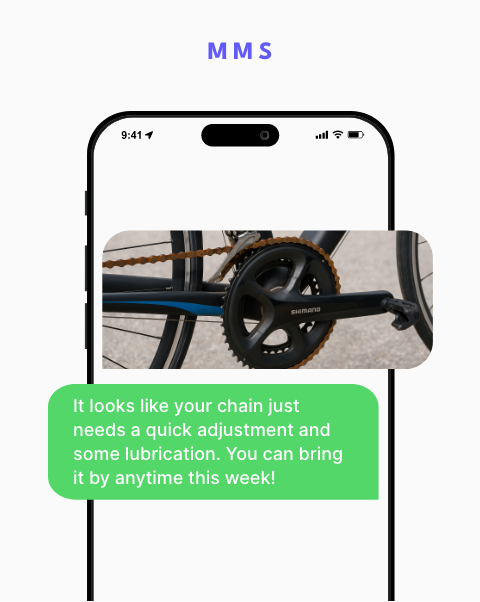A Retailer’s Guide to Rich Content Messaging: What It Is & How It Works
Text messaging has long been one of the most effective ways to connect with retail customers.
While businesses have spent the past decade adopting SMS for customer communication, personal messaging evolved in a different direction.
Consumers moved to richer, more dynamic platforms like iMessage, where group chats, images, reactions, and quick replies became the norm.
This created a gap between how people text their friends and how they hear from businesses, however this gap will soon start closing with Rich Content Messaging (RCM) for business.
In short, RCM will allow retailers to send messages that go far beyond text: think product carousels, branded visuals, and even clickable buttons – similar to iMessage or Whatsapp experiences.
As carriers roll out broader support for RCS, Ikeono is putting in the work so that retailers can take full advantage of what’s next in messaging.
In this guide, we will walk you through the basics of RCM, how it works, and how platforms like Ikeono are adopting it.
What Is Rich Content Messaging (RCM)?
RCM is an upgraded form of texting developed to replace SMS (Short Message Service).
How is this different from SMS?
Plain SMS is:
Text-only
Capped at 160 characters
Doesn’t support media unless you shift to MMS (Multimedia Messaging Service), which can still be hit or miss, depending on the device.
RCM, on the other hand, is built on Rich Communication Services (RCS), a next-gen protocol backed by Google and now embraced by Apple with iOS 18.
That means both Android and iPhone users can access rich features.
What about iMessage and Google Messages?
Think of iMessage as the OG rich messaging experience, however it was exclusive to Apple devices.
It supports things like stickers and inline previews, but it only works if both sender and receiver are on Apple.
This is why since iOS 18 you have been able to have group chats with iOS and Android users all in the same thread even though everyone is using a different device.
Now that both big players Apple and Google are on board with RCS support, RCM is becoming the new normal, regardless of the phone in your pocket.
RCM changes the game, let’s take a look at which areas it impacts the most.
A Better Experience, Across the Board
First and foremost, RCM improves how your messages show up. No more broken formatting or links feeling sketchy. Instead, you get:
Clean, branded layouts
Support for longer messages without weird breaks
Native previews for media that look professional
Verified Branding
Think of it like the blue checkmark you see on social platforms. Verified Sending gives your business that same visual cue of trust directly in your customers’ text threads.
It not only helps prevent fraud and spam confusion, but also boosts message open rates by signaling authenticity at a glance.
But the benefits go beyond security. Verified Sending unlocks full visual branding in text messages, logos, and color palettes.
Ikeono has put in the work to make sure retailers are texting from their business phone number so that when customers look up the number they are receiving a message from, they can trust that it is from the business they find on Google, RCM takes it 1 step further.
In short: Verified Sending helps businesses look more legitimate, stay on-brand, and build trust.
More Multimedia Options Than MMS
Right now, Ikeono supports MMS for sending images, and that’s already a game changer for retailers showcasing products or communicating things words can’t during a service repair.
But video? That’s where things get tricky.
MMS works for short clips, but anything longer runs into file size limits and inconsistent delivery, especially across devices. RCM fixes that.
With RCM, longer and higher-quality videos can be delivered more reliably. That means smoother video previews, tutorials, and no awkward buffering or broken links.
Suggested Replies and Actions
Gone are the days where you will ask your customers to reply 1 to take an action.
No more typing out responses, with buttons built into the message, the entire user journey happens in one seamless, branded conversation.
Read Recipients
Ever wonder if your message actually got read?
For sales and support teams, this is game-changing, it gives you the timing and context to respond smarter. As UnoTV put it in the report: “With SMS, we don’t even know if the message was delivered. With RCS, we see if it was delivered, opened, and interacted with.”
More clarity = better conversations = stronger ROI.
Final Thoughts: Rich Messaging, Retail-Ready
Rich Content Messaging isn’t a new strategy, it’s an upgrade to the tools you’re already using.
If your retail business is already sending text messages through Ikeono, adding RCM simply makes your communication sharper, more reliable, and easier for customers to engage with, especially when video or media is involved.
As RCS adoption becomes more widespread across Android and iOS, rich messaging will start to feel like the default, not something new for businesses.
That said, as Bandwidth points out, carrier support for RCS is still evolving.
What these features look like in real life may shift as they roll out. That means it’s not widely available just yet, and we’re keeping a close eye on when and how to bring it into the Ikeono platform.
When the time comes, the real value won’t be in using every feature, but in using the right ones for your business.
So whether you’re planning to show off a new product, follow up with NPS, or improve your support experience, RCM will help ensure every message lands clearly, looks great, and drives action.
Note: Rolling out RCM will happen in stages and it is currently in its infancy, as a feature and for Ikeono.





